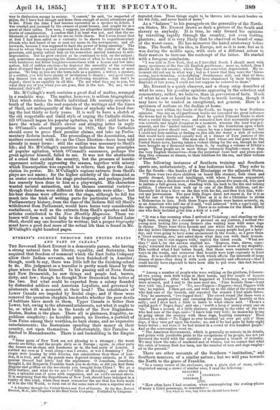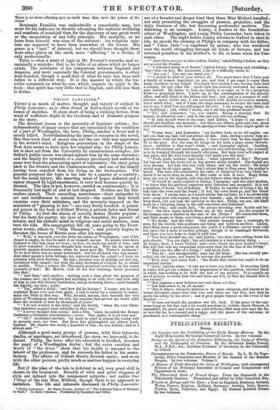EVEREST'S JOURNEY THROITGE THE *UNITED STATES AND PART OF CANADA. *
THE Reverend Robert Everest is a democratic parson, who having a strong natural turn for liberty, equality, and fraternity, has acquired that freedom of comment which the East India Company allow their Indian servants, and been finished-off in America ; though, sooth to say, there was little left for the finishing-school to do. His judgment as a traveller is pretty much biased by the place where he finds himself. In his passing call at Nova Scotia and New Brunswick, he saw things and people bad, barren, dirty, and low ; though he thought New Brunswick the better of the two. But what could be expected from a colony founded by disbanded soldiers and American Loyalists, and governed by aristocrats with a monarch at their head ? The inhabitants of Lower Canada are impeded by feudal clogs; and if these were removed the quondam chaplain has doubts whether the poor devils of habitans have much in them. Upper Canada is better than Lower, but, owing to the aforesaid aristocrats, not what it ought to be, or what it would be in the hands of the New Englanders. Boston, Boston is the place. There all is plainness, frugality, re- publican simplicity : no heraldic panels, no liveries, a portrait of Tom Paine among their worthies, no back slums, and no expensive entertainments; the Bostonians spending their money on their country, not upon themselves. Unfortunately, this Paradise is limited to Massachusetts. There is sad backsliding in the Empire City.
" Some parts of New York are not pleasing to a stranger ; the worst streets are filthy, and the people dirty as in Europe ; again, in other parts the houses are as clean and handsome as in the best parts of London. I rubbed my eyes as I went along—was I awake, or was I dreaming ? Car- riages were passing by with liveries, less ostentatious than those of Lon- don, it is true, and on the panels were depicted strange animals, as if the painter thereof had lately had the nightmare. 0 Jonathan, Jonathan, thought I, did Benjamin Franklin teach you to do this, or did you find these dragons and griffins on the tea-chests you brought from China ? We go a little further, and what do we see ?--' Office of Heraldry,' and above the door, a splendid coat of arms with supporters, and an earl's coronet above. It is surprising that the Republicans of New York should have indulged in a vanity of this kind, when they must remember the use that has been made of it in the Old World, to form out of the same race of men a superior and a • A Journey through the United States and Part of Canada. By the Rev. Robert Everest, M.A., late Chaplain to the East India Company. Published by Chapman degraded class. These things ought to be thrown into the neat bonfire on the 4th July, and never heard of more."
As a " balance " to his panegyric on the generality of the North- ern States, Mr. Everest draws as dark a picture of the South and slavery as anybody. It is true, he only formed his opinions by travelling rapidly through the country, not even visiting planters ; and it is very likely that he observed or heard of some of the worst cases. He has moreover the hated aristocracy before him. The South, in his idea, is Europe, not as it is now, but as it was during the middle ages, with serfs of a different colour to their masters to increase the contempt of the latter. He started with a foregone conclusion. "I was told in New York, that as I travelled South I should meet with many specimens of the fine old English gentleman ; more so, indeed, than I should in the old country, where they had somewhat degenerated. My in- formant did not say in what way ; but as I knew that they were the horse- racing, hard-drinking, cock-fighting' Southerners still, and that all these accomplishments except the first had been abandoned by their brethren of England of late years, I could not but suppose he referred to them."
Mr. Everest is a quick observer, and a sharp crisp describer of what he sees ; his peculiar opinions appearing in the selection and commentary, rather, we believe, than in perversion of facts. Much of what he saw or heard in the South is worth having, though it may have to be ranked as exceptional, not general. Here is a specimen of notions on the decline at home.
"Being now within the limits of the South, we began to hear Southern opinions. One day an old gentleman beside me lamented the great influence the towns had in the Legislature. Next he quoted Edmund Burke to show what a sordid thing trade was ; and remarked how that mercantile property was unstable and might disappear in a moment, whereas the land was per- manent, and the landed interest' ought to be the foundation upon which all political power should rest. Of course he was a landowner himself ; but I could not help smiling at finding on this side the water a dish of notions that would have answered equally well at a dinner of Tory justices of the ppeace in a rural district. One man also I met whose son had gone into the United States navy, having taken a violent liking for the sea, though he had been brought up a thousand miles from it, by reading a volume of Dibdin's songs. These people are in most things intensely English—more so than the very English themselves—from the perpetual roast beef and plum-pud- ding they consume at dinner, to their fondness for the sea, and their notions of freedom."
The following instances of Southern training and Southern sports are, unfortunately, of a less ludicrous kind. They refer to the far South—the banks of the Mississippi or the adjacent States.
" There were two slave children on board this steamer, both clean and neatly dressed, lively and intelligent, with whom I became acquainted. There was also a diminutive of the White race, about five years old, who used to imitate a full-grown man, standing with his back to the fire and talking politics. I observed him walk up to one of the Black children, and de- liberately hit him a blow on the face with his fist, and then kick him, with- out any provocation. The poor little Negro durst not resent it, for it is as bad for one of them to strike a White as it is for a Christian to strike a Mahometan in Asia. Both these Negro children were beaten severely, or, as an American who told me of it said, well lathered ' with a ropes end, by the captain, for romping together. There is no redress for the Black. Every one who feels inclined gives him a kick or a cuff.
•
"It was a fine morning when I arrived at Vicksburg; and standing on the high bank, waiting for a steamer to proceed on my journey, I noticed two young men looking like young farmers also waiting near with some dogs in chains. There were three hounds and one white bull terrier. It being the day before Christmas-day, I thought these young people had got a holy- day, and were going to have some amusement in the woods ; so I gave them a 'Good morning, sirs,' and asked them what they run with their hounds. We keeps 'em to run Diggers with,' replied the eldest youth. What are they ? ' said I, for the answer startled me. 'Negroes, man, slaves, runa- ways,' returned the lad again, with an expression of scorn at my stupidity. This verified what I had before heard, that there were numbers of runa- ways in the woods, and moreover that hounds were kept expressly to hunt them. It is so difficult to get at a truth which affects the interests of large classes of men—they deny it with such pertinacity and effrontery—that I could hardly have expected to have been able to put even this fact beyond
' controversy. * *
" Among a number of people who were walking on the platform, I discern- ed two young men with whips in their hands, and five couple of hounds coupled together. After what had happened at Vicksburg, my suspicions were aroused, and I said to the man next me, Fine hounds those—hunt ' deer with 'em, I suppose ?" No, no—Niggers—Niggers—hunt Nigger& with 'em,' he replied. 1 then got out, and went up to the elder of the young men who had care of the hounds, and repeated the remark I had made before. Yes,' he answered, two-legged deer.' The crowd round (for there were a number of people patting and caressing the dogs) laughed heartilyy at this
sally ; and I drew back a little to listen to what others said. hem a capital pack o' Negro dogs,' said one • worth a heap o' money every one on 'em.' Then a second, at a little distance, pointing to the elder of the twe who had care of the dogs, said—' I know him very well; he makes his living by going about the country with those dogs, hunting runaways.' Then chimed in a third—' No Nigger as ever breathed 'ud ever get quit o' those dogs, if they once got upon his tracks; no, not if he had gone by forty-eight hours before ; not even if he had mixed in a crowd of five hundred people: And so the conversation went on.
" The American Government, which is generally so minute in its details, and points with justifiable pride to the occupations of its people, has not yet favoured the world with the statistics of so unusual a branch of industry. We may know the take of mackerel and of whales, but we cannot find what the catch of human flesh has been, nor the number of men and dogs employ- ed in the pursuit.
There are other accounts of the Southern " institution," and Southern manners, of a similar nature ; but we will pass towards the North to the grave of Franklin.
"In a sunny corner of the enclosure, upon a plain slab of stone, undis- tinguished among a crowd of similar ones, I read the following :
BENJAMIN AND FRANKLIN. DEBORAH
1r90. "How often have I had occasion, when contemplating the resting-places of many a titled personage, to remember- ' Not what he was, but what he should have been.' There is no more affecting spot on earth than this, save the prison or So- crates."
Benjamin Franklin was undoubtedly a remarkable man, but more for his influence in directly advancing the material wellbeing and comforts of mankind than for the discovery of any great truth or the enunciation of any lofty principle. His morality, as we learn from himself, was none of the strictest; his religious opin- ions are supposed to have been somewhat of the lamest. His grave is a "spot" of interest, but we should have thought there were other places on the earth more " affecting " to a divine, if only professionally. There is often a want of logic in Mr. Everest's remarks, and oc- casionally a mistake ; that is, he talks of an abuse which no longer exists. The substance of his comparison between England and America, and more especially the Colonial governments, is often well-founded, though a good deal of what he says has been said before in a different way. It is the manner in which the tra- veller comments on what he sees which imparts its spirit to the book : that spirit has very little that is English, and still less that is divine.



























 Previous page
Previous page